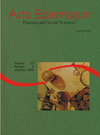<b>Dois perdidos em dois atos: a linguagem como máscara no teatro de Plínio Marcos</b> - DOI: 10.4025/actascihumansoc.v29i2.727
Résumé
As décadas de 1960 e 1970 representam um período de vasta produção artística e cultural no Brasil, contudo a censura foi o maior dilema encontrado pelos artistas, escritores e dramaturgos. No teatro, Nelson Rodrigues (1912-1980), Jorge Andrade (1922- 1994) e Plínio Marcos (1933 -1999), cada qual com seu estilo, foram censurados por suas produções. Este artigo apresenta um estudo da peça Dois perdidos numa noite suja (1966), de Plínio Marcos, que interpreta os conflitos de grupos sociais minoritários e marginalizados. Postula-se, neste trabalho, o aspecto contracultural da linguagem e sua utilização como máscara, refletindo como seu uso, no texto dramático de Plínio Marcos, apresenta-se enquanto instrumento de execração de dilemas e conflitos sócio-histórico-culturais do Brasil (1960-1970). O processo do desvelamento de uma linguagem crua se apega no uso contínuo de gírias e palavrões, visando atingir o outro ou a própria sociedade. A análise da peça pauta-se e se evidencia a partir do texto dramático e não em suas vias de encenação e dramaticidade.Téléchargements
DECLARAÇÃO DE ORIGINALIDADE E DIREITOS AUTORAIS
Declaro que o presente artigo é original, não tendo sido submetido à publicação em qualquer outro periódico nacional ou internacional, quer seja em parte ou em sua totalidade.
Os direitos autorais pertencem exclusivamente aos autores. Os direitos de licenciamento utilizados pelo periódico é a licença Creative Commons Attribution 4.0 (CC BY 4.0): são permitidos o acompartilhamento (cópia e distribuição do material em qualqer meio ou formato) e adaptação (remix, transformação e criação de material a partir do conteúdo assim licenciado para quaisquer fins, inclusive comerciais.
Recomenda-se a leitura desse link para maiores informações sobre o tema: fornecimento de créditos e referências de forma correta, entre outros detalhes cruciais para uso adequado do material licenciado.

























